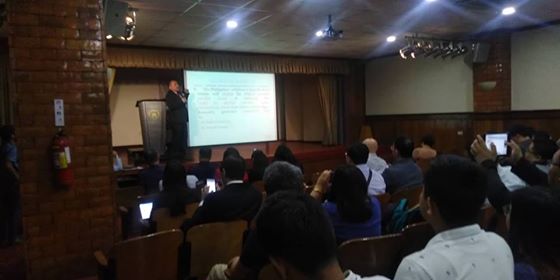CEBU CITY–The withdrawal of the Philippines from the International Criminal Court may leave the Philippines vulnerable to human rights abuses and impunity.
The warning came from lawyer Gilbert Andres, deputy executive chief of the Center for International Law in the Philippines (Central Law).
During the Justice Forum at the University of San Jose-Recoletos in Cebu City on Friday, Andres told Law students about the arguments he presented to the Supreme Court (SC) last October 9 on why Philippines must remain with the ICC.
“The fact that the Philippines withdrew from the Rome statute will actually abolish our Filipino people’s parallel means of enforcing their rights to effective remedies against international crimes committed not just by state forces and also committed by armed groups,” said Andres.
But Supt. Edhel Pereira, the Regional Philippine National Police (PNP) Legal Service in Central Visayas who is also a lawyer, argued that the Philippines can fight impunity without the need for the ICC.
“Our justice system in the Philippines is strong and as long as the government is working and the judiciary is working, we can solve impunity without the ICC,” said Pereira.
For Pereira, the Philippine laws have provided enough protection against crimes and impunity to keep the peace and order in the country.
“The Philippines is relatively peaceful even with arguments stating that there are crimes here and there. Records show that we have reduced crimes by 30 percent,” said Pereira.
He also said that the spate of killings in the Philippines are not considered extrajudicial killings but extralegal killings since the perpetrators are mostly non state-agents.
Lawyer Emerlynne Gil of the Southeast Asia International Commission of Jurists disagreed with Pereira as she said that the failure of the government to investigate these cases of extra-legal killings can be interpreted as acquiescence to the impunity and will constitute the validity of these cases as extra-judicial killings.
“The right to life is the bedrock of human rights. It cannot be violated,” she said.
Gil said that as long the government can show that they are not shielding perpetrators, there are no unjustified delays in the cases of extrajudicial killings and the courts are working, the ICC no longer needs to intervene.
However, Gil believes that the Philippines should remain with the ICC as it serves as an insurance for the country in the case that the government commits human rights abuses and fails to prosecute these abuses in its own judiciary.
Andres said that he is confident that the arguments they presented to the SC on October 9 will hold ground, yet they are also preparing for other means in the case that the SC decides that the Philippines must withdraw from the ICC.
The SC has yet to decide on whether the unilateral decision of President Duterte to withdraw the Philippines from the ICC is legal.
